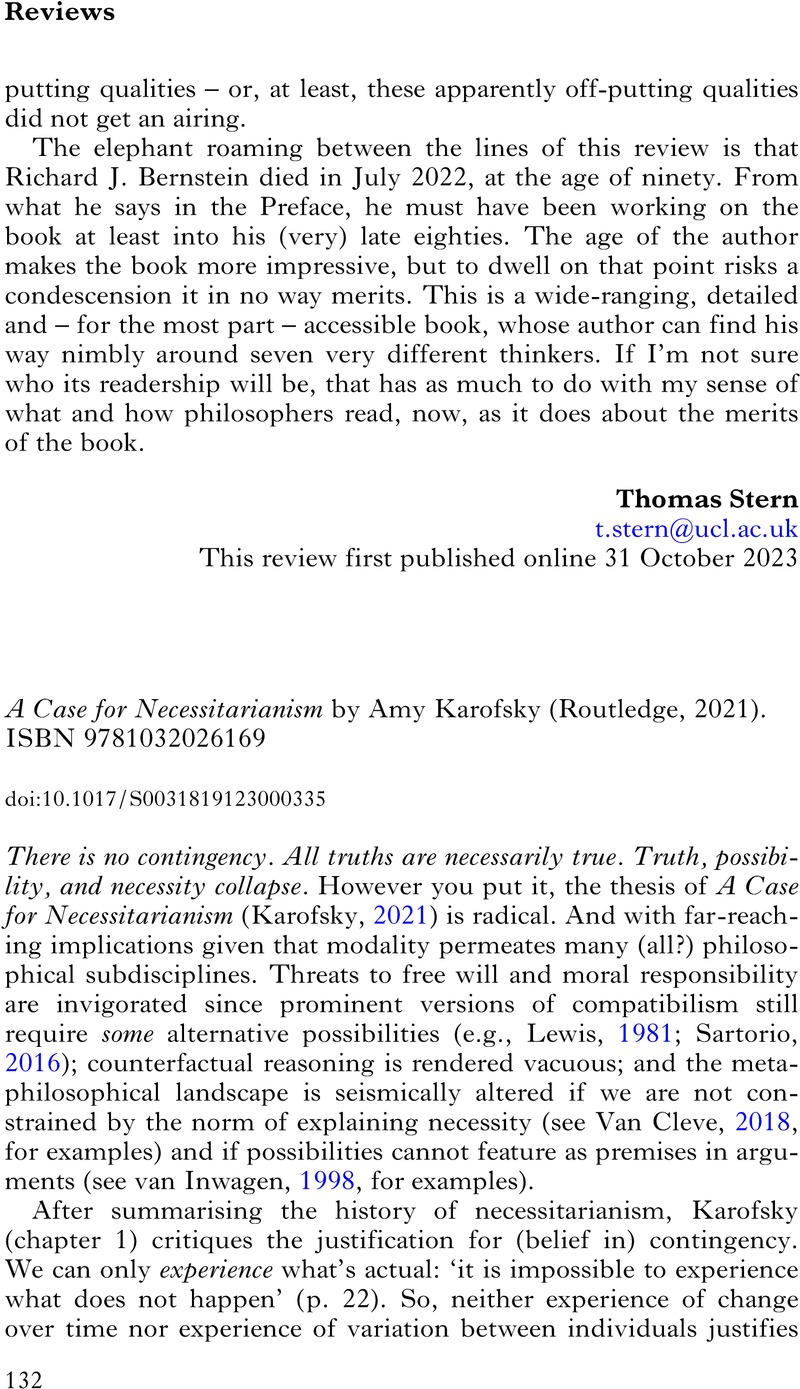No CrossRef data available.
Article contents
A Case for Necessitarianism by Amy Karofsky (Routledge, 2021). ISBN 9781032026169
Review products
A Case for Necessitarianism by Amy Karofsky (Routledge, 2021). ISBN 9781032026169
Published online by Cambridge University Press: 31 October 2023
Abstract
An abstract is not available for this content so a preview has been provided. Please use the Get access link above for information on how to access this content.

- Type
- Review
- Information
- Copyright
- Copyright © The Author(s), 2023. Published by Cambridge University Press on behalf of The Royal Institute of Philosophy
References
Armstrong, David Malet, A Combinatorial Theory of Possibility (Cambridge University Press, 1989).CrossRefGoogle Scholar
Blackburn, Simon, ‘Morals and Modals’, in Blackburn, Simon (ed.), Essays in Quasi-Realism (Oxford University Press, 1986).Google Scholar
Cowling, Sam, ‘The Limits of Modality’, The Philosophical Quarterly, 61:244 (2011), 473–95.CrossRefGoogle Scholar
Dasgupta, Shamik, ‘Realism and the Absence of Value’, The Philosophical Review, 127:3 (2018): 279–322.CrossRefGoogle Scholar
Divers, John, ‘Agnosticism About Other Worlds: A New Antirealist Programme in Modality’, Philosophy and Phenomenological Research, 69:3 (2004), 660–85.CrossRefGoogle Scholar
Fine, Kit, ‘Essence and Modality: The Second Philosophical Perspectives Lecture’, Philosophical Perspectives, 8 (1994), 1–16.CrossRefGoogle Scholar
Gibson, James, The Ecological Approach to Visual Perception (New York: Routledge, 1986).Google Scholar
Kimpton-Nye, Samuel, ‘Can Hardcore Actualism Validate S5?’, Philosophy and Phenomenological Research, 102:2 (2021), 342–58.CrossRefGoogle Scholar
Nanay, Bence, ‘Do We See Apples as Edible?’, Pacific Philosophical Quarterly, 92:3 (2011a), 305–22.CrossRefGoogle Scholar
Nanay, Bence, ‘Do We Sense Modalities with Our Sense Modalities?’, Ratio, 24:3 (2011b), 299–310.CrossRefGoogle Scholar
Sartorio, Carolina, Causation and Free Will (Oxford: Oxford University Press, 2016).CrossRefGoogle Scholar
Shalkowski, Scott, ‘The Ontological Ground of the Alethic Modality’, The Philosophical Review, 103:4 (1994), 669–88.CrossRefGoogle Scholar
Skow, Bradford, ‘The Tenseless Theory of Time and the Moodless Theory of Modality’, Pacific Philosophical Quarterly, 100:2 (2019), 506–24.CrossRefGoogle Scholar
Skow, Bradford, ‘The Moodless Theory of Modality: An Introduction and Defence’, Australasian Journal of Philosophy, 100:2 (2022), 279–95.CrossRefGoogle Scholar
Vetter, Barbara, Potentiality: From Dispositions to Modality (Oxford: Oxford University Press, 2015).CrossRefGoogle Scholar





